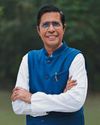
Do you think the current growth momentum, at around 7%, can be sustained till 2030 without a significant boost to demand and consumption?
What happens to India in the aggregate is a function of what is happening at the level of states. The Indian government is really a sigma of state GSDP [gross state domestic product] apart from things like defence, railways and national highways. A lot of states today are performing far below potential, there is a lot of slack.
The growth drivers have to be consumption and private investments. One of the problems of saying anything about the Indian economy is that there are time lags in data. But my reading is investments and consumption are showing signs of recovery. I am reasonably confident that in the next five years, we will have a growth rate of 7%.
Do you not think it is time for India to lower income taxes and remove exemptions to boost consumption?
Whenever I try to reduce taxes to boost consumption, I am doing two different things: firstly, I am creating discretion because I am not reducing it across the board, so there are distortions; and secondly, all resources have opportunity costs-this means whenever I am cutting taxes, I cannot spend that money on something else.
Broadly speaking, there are multiplier effects from cutting taxes, increasing revenue expenditure and capital expenditure. The multiplier effects, theoretically as well as empirically, are greater for capital expenditure, lower for revenue expenditure and lowest for cutting taxes. One reason why I think we have done relatively well post-Covid and lockdown compared to some countries in the West is because we have not cut taxes.
هذه القصة مأخوذة من طبعة May 2024 من Outlook Business.
ابدأ النسخة التجريبية المجانية من Magzter GOLD لمدة 7 أيام للوصول إلى آلاف القصص المتميزة المنسقة وأكثر من 9,000 مجلة وصحيفة.
بالفعل مشترك ? تسجيل الدخول
هذه القصة مأخوذة من طبعة May 2024 من Outlook Business.
ابدأ النسخة التجريبية المجانية من Magzter GOLD لمدة 7 أيام للوصول إلى آلاف القصص المتميزة المنسقة وأكثر من 9,000 مجلة وصحيفة.
بالفعل مشترك? تسجيل الدخول

From Chandni Chowk to Global Recognition
For Manish Aggarwal, director at Bikano, Bikanervala Foods, the family business was not just a responsibility but a passion he took to the global stage

Spotting AI Scams
Al has become an integral part of our lives, from customer service no insurance claims. But it is also becoming a tool for fraudsters who use it to scam individuals and corporations

Let a Hundred Flowers Bloom
On the banks of the Ganges in industrial Kanpur, a start-up has blossomed that turns waste flowers into incense

BATTERY LOW
India produces enough green energy to power many of its largest cities yet lacks the storage to use it efficiently. A nation blazing forward must leap ahead in battery technology to stay on course

We Have Everything Going for Rajasthan
Rajyavardhan Singh Rathore, Rajasthan’s industry and commerce minister, tells Pushpita Dey why the state is suited to become a hub for investments.

Dairy and Other Dilemmas
India’s refusal to open its dairy market has complicated trade negotiations for years. As global partners demand concessions, is the cost of protectionism outweighing benefits?

Riding in a Maze
As gig workers ride into an uncertain future with little more than a smartphone and a bike, the government is struggling to arrange a socialsafety net. But millions without social security is recipe for disaster

BIRLA'S BIGGEST BATTLE
As Kumar Mangalam Birla completes 30 years at the helm of the Aditya Birla Group, he has a battle to defend his businesses and conquer new ones

THE INNOVATION LEAP
India dreams of becoming a product nation. But unless the corporate sector significantly increases spending on R&D, the country will continue to lag behind global peers

EDUCATION BUDGET MUST DOUBLE EVERY 3 YEARS
Veezhinathan Kamakoti, a renowned academic and director of Indian Institute of Technology Madras, tells Deepsekhar Choudhury on what technology sovereignty means for India and how it can propel the country towards its vision of becoming a developed nation by 2047.